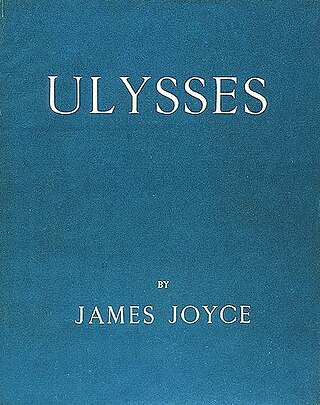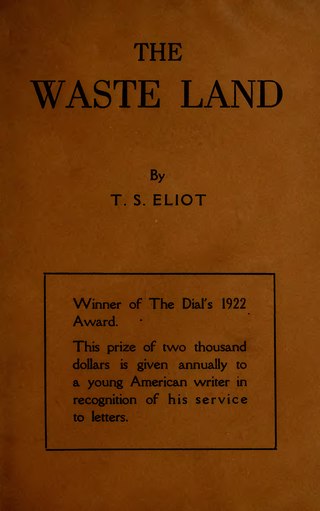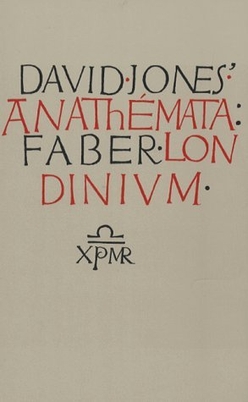
Thomas Stearns Eliot was a poet, essayist and playwright. He is considered to be one of the 20th century's greatest poets, as well as a central figure in English-language Modernist poetry. His use of language, writing style, and verse structure reinvigorated English poetry. He is also noted for his critical essays, which often reevaluated long-held cultural beliefs.

A genre of arts criticism, literary criticism or literary studies is the study, evaluation, and interpretation of literature. Modern literary criticism is often influenced by literary theory, which is the philosophical analysis of literature's goals and methods. Although the two activities are closely related, literary critics are not always, and have not always been, theorists.

Ulysses is a modernist novel by the Irish writer James Joyce. Parts of it were first serialized in the American journal The Little Review from March 1918 to December 1920, and the entire work was published in Paris by Sylvia Beach on 2 February 1922, Joyce's fortieth birthday. It is considered one of the most important works of modernist literature and has been called "a demonstration and summation of the entire movement". According to the writer Declan Kiberd, "before Joyce, no writer of fiction had so foregrounded the process of thinking".
In literary criticism, stream of consciousness is a narrative mode or method that attempts "to depict the multitudinous thoughts and feelings which pass through the mind" of a narrator.

The Times Literary Supplement (TLS) is a weekly literary review published in London by News UK, a subsidiary of News Corp.

"The Love Song of J. Alfred Prufrock", commonly known as "Prufrock", is the first professionally published poem by American-born British poet T. S. Eliot (1888–1965). The poem relates the varying thoughts of its title character in a stream of consciousness. Eliot began writing "Prufrock" in February 1910, and it was first published in the June 1915 issue of Poetry: A Magazine of Verse at the instigation of fellow American expatriate Ezra Pound. It was later printed as part of a twelve-poem chapbook entitled Prufrock and Other Observations in 1917. At the time of its publication, "Prufrock" was considered outlandish, but the poem is now seen as heralding a paradigmatic shift in poetry from late 19th-century Romanticism and Georgian lyrics to Modernism.
William Hugh Kenner was a Canadian literary scholar, critic and professor. He published widely on Modernist literature with particular emphasis on James Joyce, Ezra Pound, and Samuel Beckett. His major study of the period, The Pound Era, argued for Pound as the central figure of Modernism, and is considered one of the most important works on the topic.

Trevor Joyce is an Irish poet, born in Dublin.

Harold Hart Crane was an American poet, best known for his only long poem, The Bridge. Inspired by T. S. Eliot, Crane wrote highly stylized modernist poetry, often noted for its complexity. He published poems in various literary magazines throughout his life, as well as two collections: White Buildings (1926) and The Bridge (1930). White Buildings helped to cement his place in the avant-garde literary scene of the time. In The Bridge, he tried to write an epic poem in the style of The Waste Land, that expressed a more optimistic view of modern, urban culture than the one that he found in Eliot's work. The Broken Tower (1932) was meant to be his last published poem. However, it only appeared in print following his death.
New Criticism was a formalist movement in literary theory that dominated American literary criticism in the middle decades of the 20th century. It emphasized close reading, particularly of poetry, to discover how a work of literature functioned as a self-contained, self-referential aesthetic object. The movement derived its name from John Crowe Ransom's 1941 book The New Criticism.

George Holbrook Jackson was a British journalist, writer and publisher. He was recognised as one of the leading bibliophiles of his time.

Modernist literature originated in the late 19th and early 20th centuries, and is characterised by a self-conscious separation from traditional ways of writing in both poetry and prose fiction writing. Modernism experimented with literary form and expression, as exemplified by Ezra Pound's maxim to "Make it new." This literary movement was driven by a conscious desire to overturn traditional modes of representation and express the new sensibilities of the time. The immense human costs of the First World War saw the prevailing assumptions about society reassessed, and much modernist writing engages with the technological advances and societal changes of modernity moving into the 20th century. In Modernist Literature, Mary Ann Gillies notes that these literary themes share the "centrality of a conscious break with the past", one that "emerges as a complex response across continents and disciplines to a changing world".
Michael Groden was a distinguished professor of English at the University of Western Ontario.
"The Frontiers of Criticism" is a lecture given by T. S. Eliot at the University of Minnesota in 1956. It was reprinted in On Poetry and Poets, a collection of Eliot's critical essays, in 1957. The essay is an attempt by Eliot to define the boundaries of literary criticism: to say what does, and what does not, constitute truly literary criticism, as opposed to, for example, a study in history based upon a work of literature. The essay is significant because it represents Eliot's response to the New Critical perspective which had taken the academic study of literature by storm during Eliot's lifetime. It also presents an analysis of some of its author's own poetic works, an unusual characteristic for modern criticism—it has become far more usual today for poets and critics to be in separate camps, rather than united in one individual. Perhaps even more importantly, it demonstrates the progress and change in Eliot's own critical thought over the years between 1919 and 1956.

The Waste Land is a poem by T. S. Eliot, widely regarded as one of the most important English-language poems of the 20th century and a central work of modernist poetry. Published in 1922, the 434-line poem first appeared in the United Kingdom in the October issue of Eliot's magazine The Criterion and in the United States in the November issue of The Dial. Among its famous phrases are "April is the cruellest month", "I will show you fear in a handful of dust", and "These fragments I have shored against my ruins".

Harold Bloom was an American literary critic and the Sterling Professor of humanities at Yale University. In 2017, Bloom was called "probably the most famous literary critic in the English-speaking world". After publishing his first book in 1959, Bloom wrote more than 50 books, including over 40 books of literary criticism, several books discussing religion, and one novel. He edited hundreds of anthologies concerning numerous literary and philosophical figures for the Chelsea House publishing firm. Bloom's books have been translated into more than 40 languages. He was elected to the American Philosophical Society in 1995.
Keith Alldritt is a contemporary British novelist, biographer and critic.
William Howell Quillian is an American literary critic and James Joyce scholar. He is Professor Emeritus of English at Mount Holyoke College.

The T. S. Eliot bibliography contains a list of works by T. S. Eliot.

The Anathemata is an epic poem by the British poet David Jones, first published in England in 1952. Along with 1937's In Parenthesis, it is the text upon which Jones' reputation largely rests.











